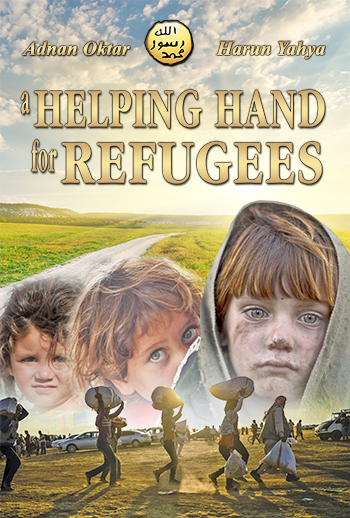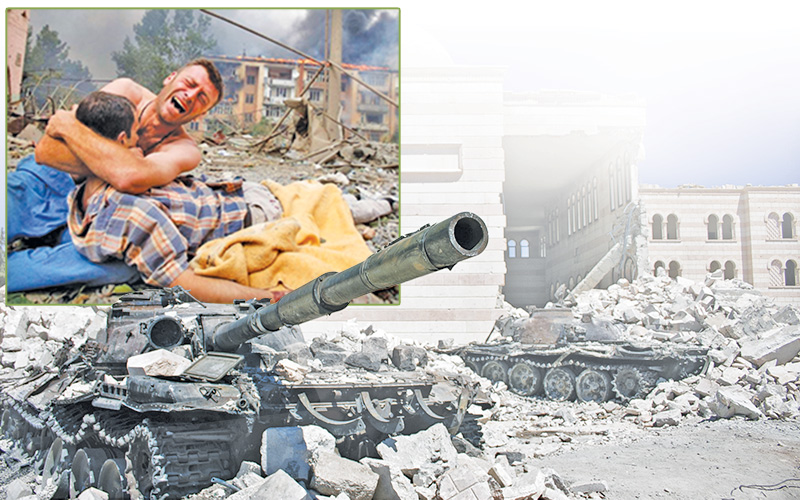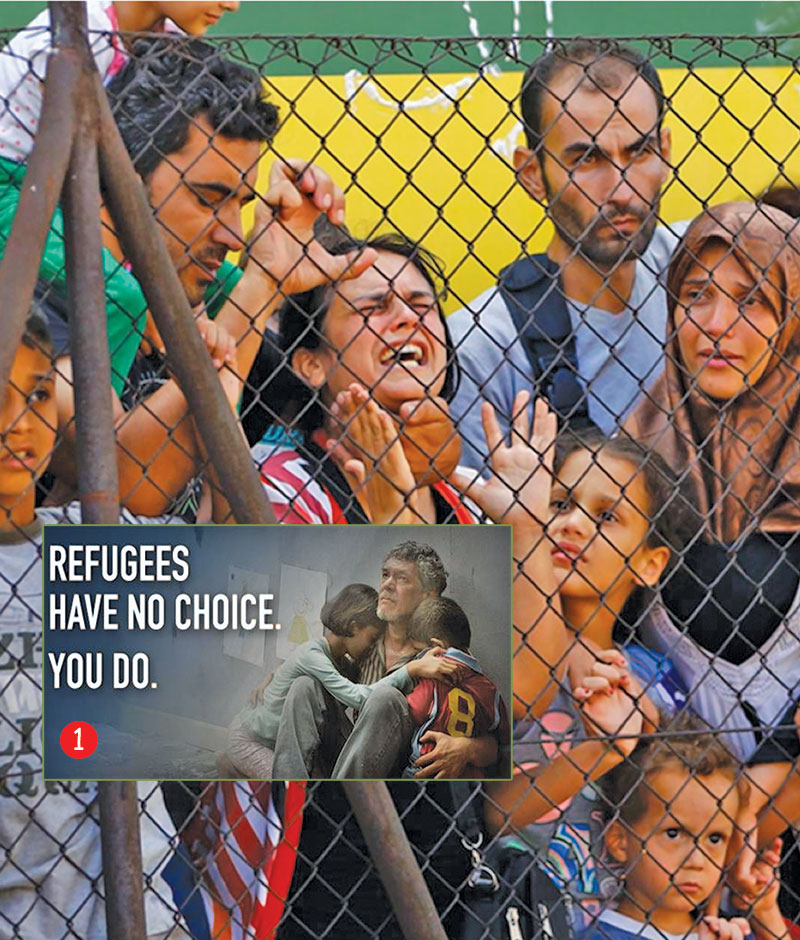Bigotry: The Dark Danger
A Helping Hand for Refugees

DOWNLOAD THE BOOK
CHAPTERS OF THE BOOK
- Introduction
- Supporting refugees is the behavior that will be most pleasing to God
- Adnan Oktar's remarks concerning refugees on A9 TV
- Events in Myanmar are crime against humanity
- A cry for help to the U.N. from Rohingya of Myanmar
- What if you were living in a refugee camp?
- The crime against humanity in Yarmouk must be ended as a matter of urgency!
- Behind the persecution in Myanmar
- How does it feel to be a Rohingya?
- One of the dozens of problems facing Yemen is immigration
- Refugees: Stopping the Madness
- The safety of our Syrian refugee brothers is entrusted to the hospitable Turkish people
- Buffer Zone: A Safe Haven for the Syrians
- A secure zone must be established at once on the Turkish-Syrian border
- The conundrum of Libya's refugees and migrants
- Drowning migrants is a blot on humanity
- Are the boat people a burden for Thailand?
- Deafening silence over Rohingya issue
- What can European countries do against the tide of Migration?
- The Rohingya Muslims are being exiled in their own lands
- Syrian refugees in the 4th year of the crisis
- Syria: The downward spiral of desolation
- Illegal immigrants: Only a statistic in Europe
- Syria’s human tragedy
- Yarmouk cries for help
- The world refugee problem can be solved with love
- Adnan Oktar's Remarks Concerning Refugees on A9 TV
- Europe must step up for humanity
- Nobody to wipe Rohingyas’ tears
- Asylum seekers: A problem of humanity or security?
- It is no economic loss to help Syrian refugees
- A heart for helping refugees
- When conscience fails, children suffer
- Events of global shame
- Will Europe pass the refugee test?
- Condemning refugees to death
- The European refugee crisis: Only if there were some empathy
- The priority in Libya must be to establish love and affection between the blocs: Consensus will then come naturally
- Refugees with no great expectation
- Walls cannot be a solution to security issues
- Refugees not a threat, but an important asset for Europe
- What will election victory bring to the people of Rohingya?
- Humans have rights on paper, but apparently not in real life
- EU, Turkey find silver lining
- Refugees are the victims of the Paris attacks, not its perpetrators
- Being leaderless is the reason behind the oppression Muslims suffer
- The EU is in danger of taking Turkey for granted
- Conclusion
< <
34 / total: 48
Events of global shameArab News – 3 July 2015
Two important events in June are reminders of two genocides. The first is the Rwanda massacre, which has gone down in history as the worst documented genocide, and the second is the drama of Srebrenica. World leaders remember both with their heads bowed. 'We should never have allowed it,' they say, but it happened anyway. Let us travel back in time. On April 7, 1995, the Rwandan Army, largely made up of Hutus, embarked on the genocide of the Tutsi minority in the country, and the world sat back and merely watched one of the worst slaughters of the century. The concept of a 'superior race,' one of the major obsessions and worst frauds of materialist thinking, was applied to the people of Rwanda, who had lived together in peace for many years. Sections in Europe who produced ideas based on race claimed that the people living in the area of Rwanda were an intermediate race between the Aryan race and an inferior race. For that reason, the Hutus began regarding the Tutsis as not true Rwandans and to think of them as related to the colonialists from European countries who constantly humiliated and exploited them. We all know what came next; rarely has history seen such ruthless and ghastly slaughter. In just 100 days, 800,000 Tutsis and moderate Hutus were ferociously slaughtered. During the slaughter, which came to an end in July, the UN Peace Force was withdrawn on the pretext of death of 10 soldiers, and even the former colonial powers in the region just watched this genocide everyone knew was coming. It was followed by Francois Mitterand's disastrous statement that he gave to French daily, Le Figaro, on Jan 12, 1998, saying, "Genocide in that country is not so very important." Another terrible act of genocide happened on June 11, 1995. During the Bosnian War, the city of Srebrenica in Bosnia-Herzegovina was declared a safe zone by the UN. People in the war zone flooded this 'safe zone,' and a city with a pre-war population of 20,000 came to house 60,000. Dutch troops charged with protecting the region handed over to the Serbs the city and 25,000 people who were seeking their protection at the command of Dutch General Thom Karremans, commander of the UN Peacekeeping Force. The slaughter that went on for a week left behind the most awful picture of genocide, one in which no allowance was made for women or children. To date, 64 mass graves connected with the massacre have been identified. The search for more is still going on.
This massacre, which took place before the eyes of the 400-member Dutch Peacekeeping Force charged with protecting the region, is commemorated every July with declarations of apology from officials from European countries and UN representatives. The UN was too feeble even to protect this 'safe zone' under its control. Could the worst genocide in history, that in Rwanda, not have been prevented by the secret forces in charge of the region? Was the UN, represented by 193 countries, really too feeble to protect the little region like Srebrenica with two F-16s and a commanding officer who handed over the local people to the Serbs? Of course, not. That is why they hang their heads as they recall these scenes of savagery. Back to the present day. History is clearly repeating itself. A similar genocide is now taking place on an even larger scale in Syria. Some 300,000 people have died there in the last four years, 1.2 million have been injured and 11 million people have been forced from their homes. Although some European countries have reported the use of chemical weapons, torture and deliberate bombing of civilian areas, many countries are just watching what is happening. The place the reports are delivered to is again the UN, where 193 countries are represented. Yet UN is unable to find a solution to the refugees fleeing the country or to establish safe zones, let alone find a solution to the genocide in the country. Of course it would be wrong to blame the US, European countries or the UN directly when it comes to Syria. However, it still appears that in some people's eyes, 'Genocide in that country is not so very important.' Were it not for self-interest, and if such materialist obsessions as 'superior races' were not still prevalent in European countries in particular, and if 'humanity' were a matter of greater urgency than political maneouvering, then there is no doubt that the picture in Rwanda, Bosnia and Syria would be very different. In that event, the five permanent members of the UN Security Council would be quite capable of taking a joint decision over each tragedy, and the billions spent on fun or just frittered away would be spent on the refugees instead. Safe zones would be set up at once and a global deterrent force against the threat ravaging the country would be established. Maybe the problem lies in expecting the UN or the super powers to do everything. In order to avoid seeing further genocide and heads bowed low in the future, rational people need to come together and constitute a force whose voice can be heard, rather than leaving decisions affecting the world up to just five countries. This article was published in Arab News: Related Links: Link of Article in English: Link of Article in Turkish:
|
34 / total 48
You can read Harun Yahya's book A Helping Hand for Refugees online, share it on social networks such as Facebook and Twitter, download it to your computer, use it in your homework and theses, and publish, copy or reproduce it on your own web sites or blogs without paying any copyright fee, so long as you acknowledge this site as the reference.


